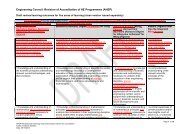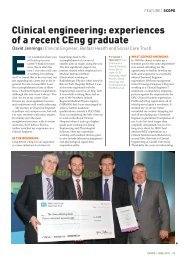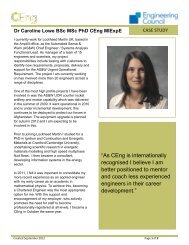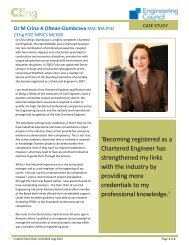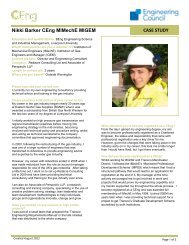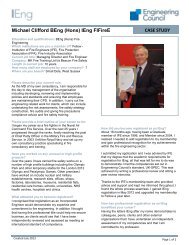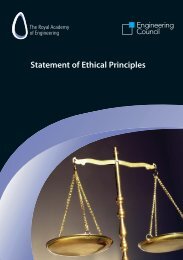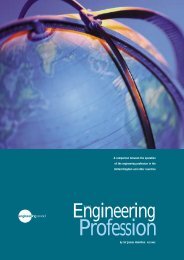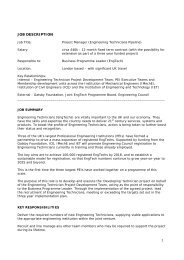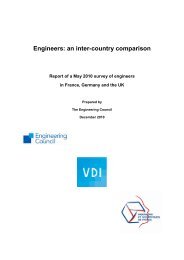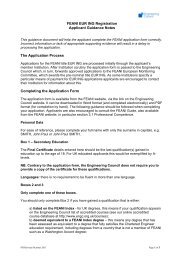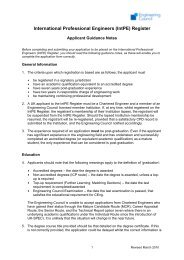An Engine for Change - A Chronicle of the Engineering Council
An Engine for Change - A Chronicle of the Engineering Council
An Engine for Change - A Chronicle of the Engineering Council
You also want an ePaper? Increase the reach of your titles
YUMPU automatically turns print PDFs into web optimized ePapers that Google loves.
52A CHRONICLE OF THE ENGINEERING COUNCILBy November 1985, 115 industrial organizations, as Industrial Affiliates, were subscribing to<strong>the</strong> EngC’s work. They first met toge<strong>the</strong>r as an “Industrial Forum” in that month, with 94senior executives participating. During 1986, although four Industrial Affiliates withdrewafter mergers and takeovers, a fur<strong>the</strong>r 40 were recruited, resulting in a total <strong>of</strong> 166 <strong>of</strong> <strong>the</strong>leading UK companies with a combined annual turnover <strong>of</strong> £300 billion, and bringing into<strong>the</strong> EngC almost £465,000 a year. The Industrial Forum became an annual event, <strong>the</strong> secondForum being organised and hosted by <strong>the</strong> EngC in November 1986, attended by 100 directorsand senior managers from over 70 <strong>of</strong> its Industrial Affiliates. The EngC Newsletter <strong>of</strong> March1987 announced a target <strong>of</strong> 1,600 Companies by 1991.Besides <strong>the</strong> financial support to <strong>the</strong> EngC that Industrial Affiliates brought, <strong>the</strong> essential aimwas to improve industrial per<strong>for</strong>mance by heightening <strong>the</strong> respect <strong>for</strong> <strong>the</strong> pr<strong>of</strong>essionalengineer and technician. This began to bear fruit during 1986 as <strong>the</strong> concept <strong>of</strong> registration<strong>for</strong> engineers and technicians gained ground. Meetings were held with Industrial Affiliates inEdinburgh, Glasgow, Manchester and Birmingham and two were held in London. The topic<strong>of</strong> <strong>the</strong> first London meeting, Continuing Education and Training (CET), resulted in ‘A Call toAction’ [already mentioned above under <strong>the</strong> CET heading] being published in June 1986,following which a working party was set up to consider a ‘career manager’ document. InChapter 4 we shall look at <strong>the</strong> output from this working party, a consultative document thatwas eventually published in 1988. The second London meeting in 1986 resulted in two EngCbooklets being published: ‘The Shortage <strong>of</strong> Ma<strong>the</strong>matics and Physics Teachers’ in May and‘On Being a School Governor’ in July, taking advantage <strong>of</strong> <strong>the</strong> Education Act (1986), toencourage engineers and technicians to become Governors.<strong>An</strong> <strong>Engine</strong>ering Working Group was set up by <strong>the</strong> EngC to identify what should be done tomark Industry Year 1986. This Group made a significant contribution to <strong>the</strong> ultimate success<strong>of</strong> Industry Year, particularly in streng<strong>the</strong>ning industry/education links. The Working Groupcontinued to play its part during 1987 under <strong>the</strong> banner <strong>of</strong> “Industry Matters”, following up<strong>the</strong> sterling work undertaken during <strong>the</strong> previous Industry Year.A conference to promote an industrial dimension in teacher training courses was organised in1987 at Homerton College jointly with <strong>the</strong> University <strong>of</strong> Cambridge and in association withIndustry Matters and Industrial and Commercial Perspectives.The Chairman wrote to <strong>the</strong> Industrial Affiliates in 1987 regarding Registration and <strong>the</strong> use <strong>of</strong><strong>the</strong> CEng and TEng titles; he received 100 supportive replies with only two reservations.During this year regional meetings <strong>of</strong> Industrial Affiliates were hosted by British NuclearFuels Limited at Risley and by <strong>the</strong> United Kingdom Atomic Energy Authority at <strong>An</strong>nan.Presentations were made to <strong>Engine</strong>ering Employer’s Boards in <strong>the</strong> Midlands and SouthLancashire, to <strong>the</strong> local branch <strong>of</strong> <strong>the</strong> Institute <strong>of</strong> Directors and to <strong>the</strong> Chief Executives’ Clubin Surrey, and to 75 invited industrialists and academics at Hatfield Polytechnic. ManyIndustrial Affiliates were concerned that <strong>the</strong>re was a need <strong>for</strong> graduates in subjects o<strong>the</strong>r thanIn<strong>for</strong>mation Technology. Accordingly, in 1987 <strong>the</strong> EngC persuaded <strong>the</strong> Government toprovide funds <strong>for</strong> courses in Manufacturing Systems <strong>Engine</strong>ering as <strong>the</strong> second stage <strong>of</strong> <strong>the</strong><strong>Engine</strong>ering and Technology programme ‘The Switch’. In addition, <strong>the</strong> National AdvisoryBoard <strong>for</strong> Public Sector Higher Education announced a special initiative that produced 30extra places on courses starting in 1988.Pursuing its championing <strong>of</strong> engineering and technology <strong>the</strong> EngC made major submissionsin 1987 in response to <strong>the</strong> report <strong>of</strong> <strong>the</strong> Select Committee on Science and Technology ‘Civil© <strong>Engine</strong>ering <strong>Council</strong> UK 2004



